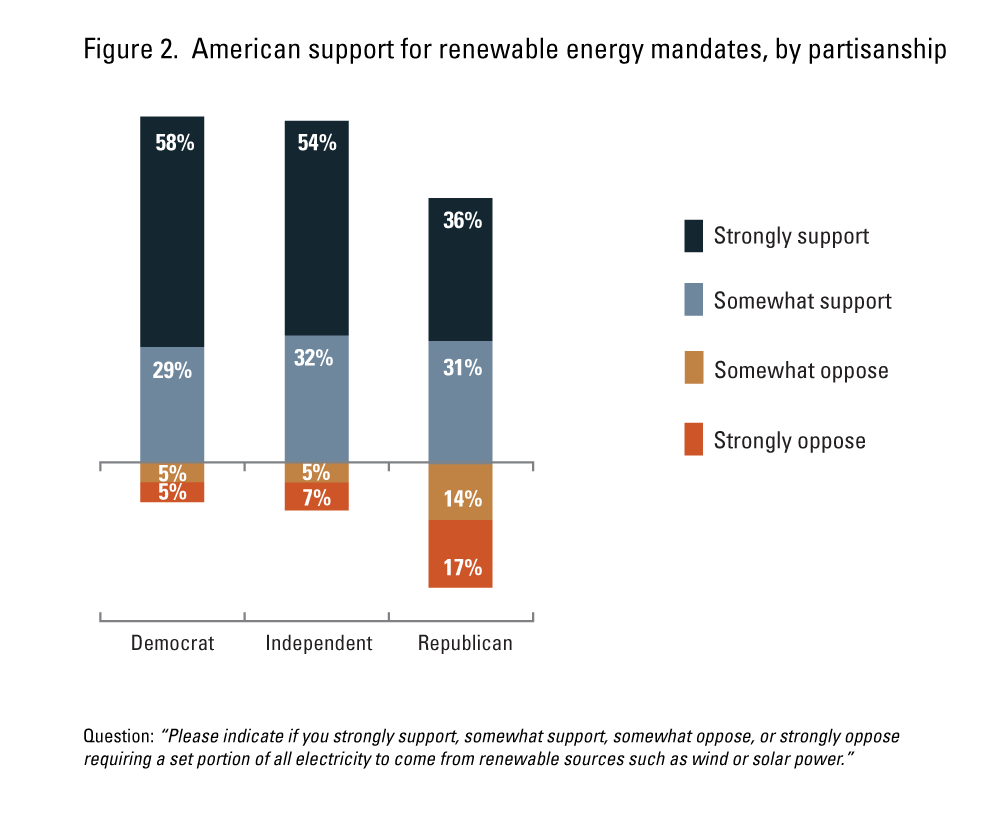-
Americans Prefer Renewable Energy Requirements Over a Carbon Tax
There are many questions about where President Trump and the new administration stands on energy and climate policy, but new survey data gives a better picture of what the American public thinks.
Data from the most recent wave of National Surveys on Energy and the Environment (NSEE), a project by Muhlenberg College and the University of Michigan, suggests that there is only a modest appetite in the United States for putting a price on carbon pollution. However, there is significant support across party lines for placing renewable energy requirements on electric utilities. As a result, it wouldn’t be surprising if carbon pricing falls farther off the American climate policy agenda during the next four years and instead there is a return to the status quo of the last two decades, where state-level renewable portfolio standards were quite popular politically, backed by a mixture of supportive state and federal programs, including tax incentives.
This is in stark contrast to Canada, where after nine years of the conservative Harper Administration, Prime Minister Justin Trudeau is quickly taking steps to move the country in a different direction. Trudeau recently completed initial negotiations with the provinces and territories on a national carbon price floor, one that may feature some form of the kind of carbon tax pioneered nearly a decade ago in British Columbia.
Trump will not be going there, and indeed there seems to be little appetite in the United States generally for such a measure. Hillary Clinton would not commit to a carbon tax either during the long 2016 campaign, and in November voters in Washington State decisively rejected a carbon tax ballot proposition modeled after the one crafted by their British Columbian neighbors.
The authors compare public attitudes toward climate change in the United States and Canada at the Wilson Center on December 15, 2016 Survey Says…
The latest NSEE survey contacted a random sample of 940 adult residents of the U.S. via telephone (both landline and cell phones) just prior to the U.S. election, from October 13 through November 6 (for more on methodology, see here). When asked about putting a price on carbon pollution with no detail about the actual price, 47 percent of Americans said they would support such a policy and only 17 percent strongly supported such a move.
When a dollar figure commensurate with the Canadian plan was attached to the policy, support predictably dropped. If the carbon price increased the price of gasoline by 8 cents per gallon, equivalent to Trudeau’s $10 per tonne carbon price starting in 2018, just 38 percent of respondents said they would support it. And at 42 cents per gallon, the Trudeau value by 2022, just 28 percent of Americans said they would support it.
By contrast, the same survey found overwhelming support for requiring electric utilities to increase their use of renewable energy, a policy commonly referred to as a renewable portfolio standard (RPS). The latest NSEE found 81 percent of Americans supported such requirements, with a full half of respondents saying they strongly support such requirements.
Though there is higher support for such requirements among Democrats and liberals, renewable requirements were also supported by 67 percent of Republicans and 66 percent of Americans who describe their political beliefs as “very conservative.” Even among those Americans who responded on the survey that they do not think that the Earth is warming (i.e., those that believe that climate change is not happening), 61 percent said they would support renewable energy requirements.
Indeed, the RPS is not a theoretical abstraction. Historically, it has been the policy of choice among U.S. states wishing to act on climate change and those eager to foster energy transition for other environmental or economic reasons. Renewable portfolio standards have generally retained durable political support in many states despite partisan leadership of state government, and are currently in place in more than half of states, with significant coverage in every region of the nation except the Southeast.
Energy Secretary-designate Rick Perry championed an RPS policy in 2005, when he expanded a program initially endorsed by his Texas gubernatorial predecessor, George W. Bush. Perry also used electricity bill “fees” (known as a “tax” in other jurisdictions) to facilitate a massive expansion of transmission capacity to better link wind with other sources in electricity demand centers around the state.
Looking Ahead
On the one hand, the Trump era might reverse previous American commitments to international climate agreements as well as regulatory policies designed to reduce domestic greenhouse gas emissions from the transportation and electricity generation sectors. This would reflect Trump’s frequent campaign pronouncements challenging the existence of climate change – though we still lack any specific policy proposals on these matters.
On the other hand, encouraging renewable energy portfolios is in many respects consistent with EPA Administrator-nominee Scott Pruitt’s statements about an era of “cooperative federalism” that respects state prerogatives and does not deter them from taking innovative steps.
Recent trends toward de-carbonization are likely to continue in the United States, regardless of federal action. A carbon tax is unlikely anytime soon, but given their popularity, it seems clear that the Trump Administration and Secretary Perry (assuming his confirmation) will have to contend with renewable portfolio standards and the many related policies linked to this form of energy transition.
Barry Rabe is the J. Ira and Nicki Harris family professor at the Gerald R. Ford School of Public Policy at the University of Michigan, and a former public policy scholar at the Wilson Center’s Canada Institute.
Sarah Mills is a postdoctoral fellow at the University of Michigan’s Center for Local, State, and Urban Policy.
Christopher Borick is professor of political science and director of the Muhlenberg College Institute of Public Opinion.
Sources: The Brookings Institution, The Federal Idea, The Hill, Industry Dive, InsideClimate News, MIT Technology Review, NBC News, National Conference of State Legislatures, The New York Times, Reuters, U.S. Energy Information Administration, University of Michigan, The Wall Street Journal, The Washington Post.
Image Credits: Used with permission courtesy of the authors.
Topics: Canada, climate change, demography, development, energy, environment, featured, Guest Contributor, mitigation, North America, U.S.
 A Publication of the Stimson Center.
A Publication of the Stimson Center.








